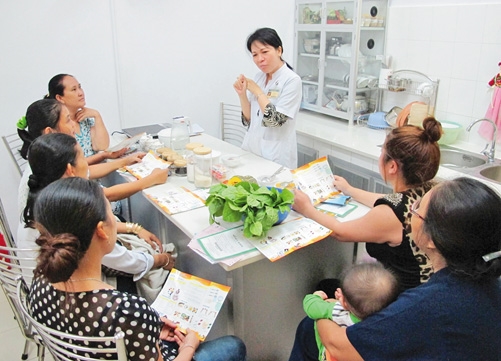

The obesity rate among Vietnamese school-aged children has increased, particularly in big cities like Hà Nội, HCM City, Đà Nẵng and Hải Phòng.
 |
| The obesity rate among Vietnamese school-aged children has increased, particularly in big cities like Hà Nội, HCM City, Đà Nẵng and Hải Phòng.— VNA/VNS Photo Phương Vy |
HÀ NỘI — The obesity rate among Vietnamese school-aged children has increased, particularly in big cities like Hà Nội, HCM City, Đà Nẵng and Hải Phòng.
The number of overweight children at primary schools in Hà Nội rose to 40 per cent - and ranged between 30-40 per cent in HCM City, Đà Nẵng and Hải Phòng - according to the Deputy Head of the National Institute of Nutrition, Nguyễn Thị Lâm.
Poor nutrition at school was the main cause for the increasing obesity rate, she said.
An appropriate school menu for children would help kids eat more-balanced meals, helping reduce the rate of childhood obesity. But planning nutritional meals is complicated and needs support from nutrition experts. So this can only be done properly at nursery schools and kindergartens, at present.
Meanwhile, nutrition for children at primary schools and upwards mostly depends on the amount of money their parents pay. And the menu and portions for normal, overweight and obese kids are the same.
The amount of food children eat at school is also difficult for parents and teachers to control.
The lack of physical activities for children is also part of the problem. According to a study by the institute, more than 30 per cent of children in Việt Nam spend three hours a day at home, sitting while eating, watching television, and playing online games. This rate increases to 50 per cent of children aged 16-17 and 34 per cent of children aged 13-15.
Making the matter worse, up to 53 per cent of mothers in Hà Nội do not know their children’s weight exceeds standards, according to the institute.
Việt Nam has nearly five million diabetic patients; the diabetes rate of people aged 20-79 increased from 1.2 per cent in 1990 to 5.8 per cent in 2013, according to the health ministry.
To help children at schools eat healthier meals, the institute is co-operating with the education and training departments of big cities - like Hà Nội, HCM City, Hải Phòng and Đà Nẵng - to implement a trial programme to consult with schools to improve daily meals for pupils.
The programme includes activities such as equipping teachers and pupils with knowledge relating to daily nutrition. It also helps schools plan menus with more nutritious food, to help deal with childhood malnutrition and obesity. — VNS